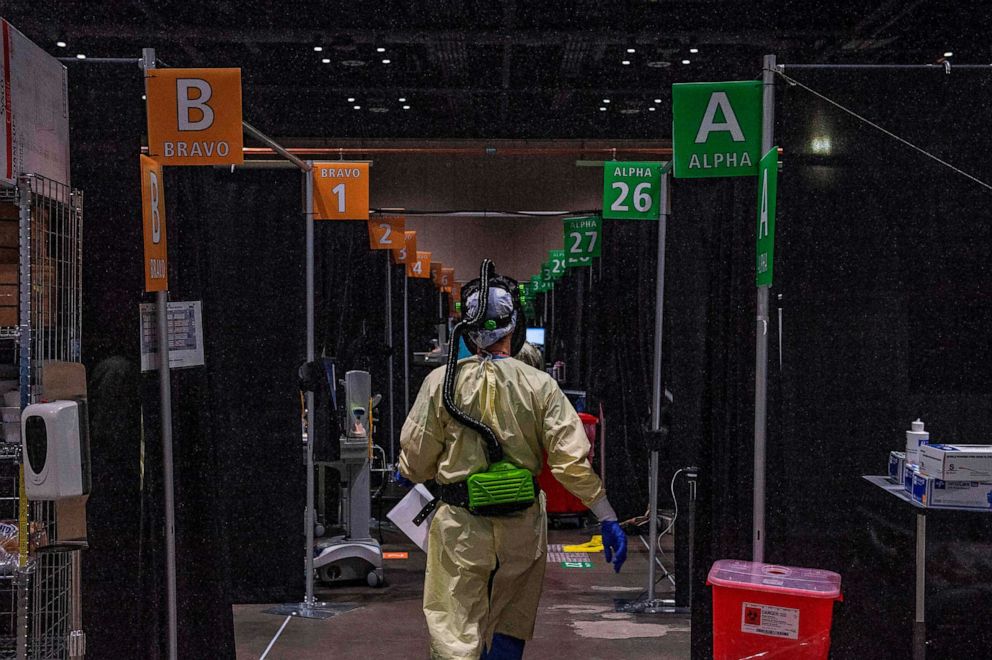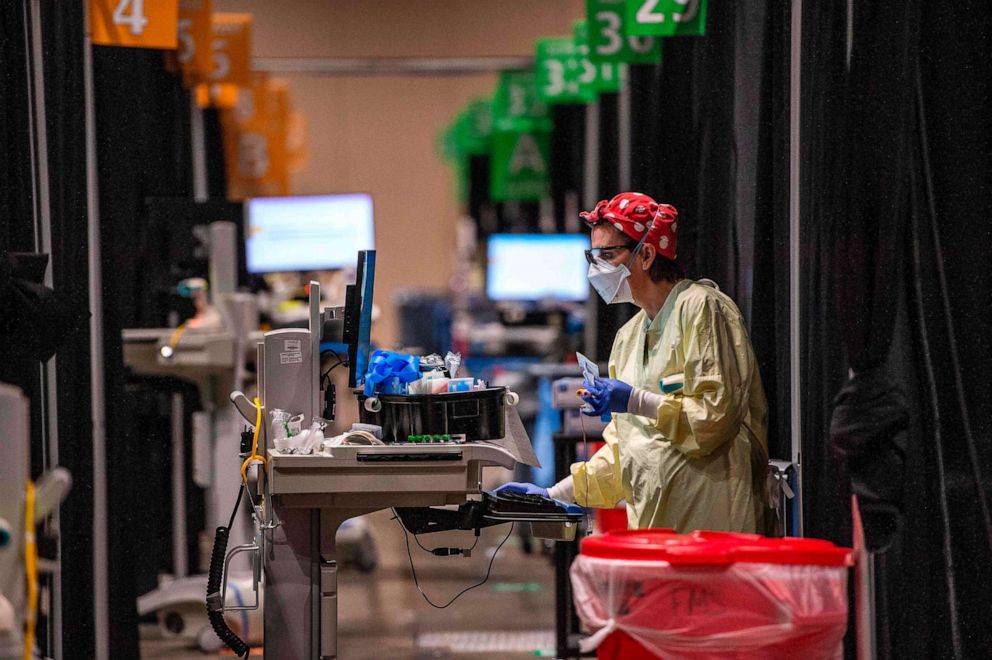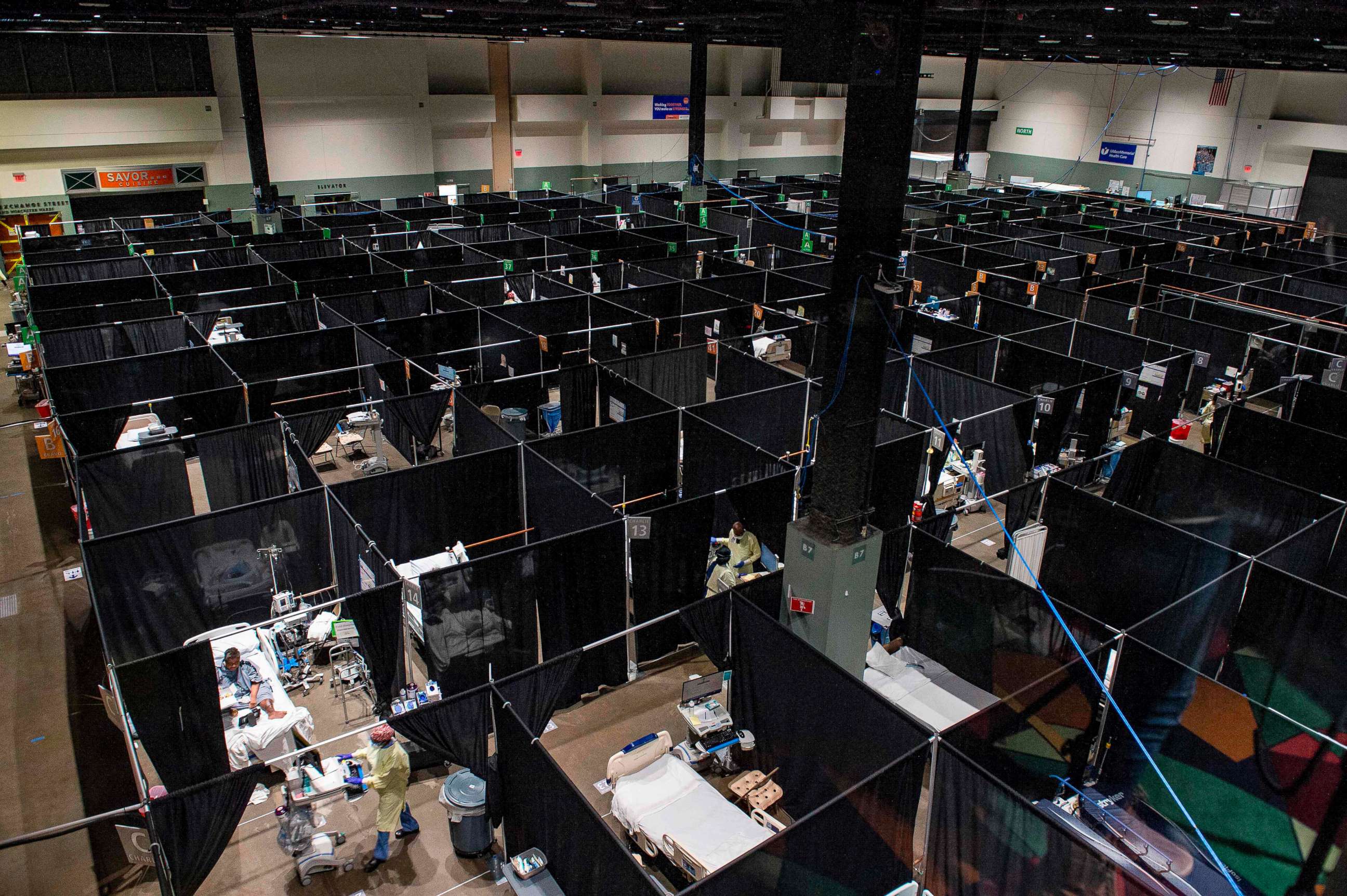An inside look at a Massachusetts field hospital that's treated hundreds
Since reopening in December, it's served nearly 400 patients.
Michael Gadbois, a first responder, was used to going the DCU Center for concerts and sporting events.
But his most recent trip there was as a COVID-19 patient.
"I never thought I would be going into the convention center on a stretcher," Gadbois told ABC News, which was given exclusive access to the UMass Memorial Medical Center's field hospital at the DCU Center in Worcester, Massachusetts.
Since Thanksgiving, the seven-day average of daily cases in Massachusetts has increased by 176%. The number of hospitalizations is the highest since May, and on Wednesday, the state surpassed 13,000 confirmed COVID-19-related deaths since the beginning of the pandemic.
I didn't like wearing the mask, and of course that's how I got it.
Just last week, Massachusetts Gov. Charlie Baker announced that the state would escalate all hospitals to Tier 4 status, the "highest level of concern," which indicates active, ongoing constraints warranting Department of Health intervention. Officials also said on Thursday that "hospital capacity limits are being stretched to their limit."

Massachusetts first opened the UMass Memorial field hospital last spring at the onset of the virus, but when patient numbers began to dwindle in May, the facility closed. When the state began to see a resurgence in cases, Baker made the decision to reopen the facility in early December.
"This was a blank empty space when we started six, seven weeks ago," said John Broach, an emergency medicine specialist at UMass Memorial Hospital and the field hospital's medical director.
Since reopening, the field hospital has treated nearly 400 patients.
"The second surge has been much worse than the first," Broach told ABC News. "It's long hours, it's not a traditional work environment and everybody's sort of adjusting to that."
Converted from an indoor arena and convention center, the complex has been transformed into a full-fledged hospital operation with respiratory devices, X-ray machines while mobile pharmacies line curtain-drawn patient rooms.
The site was built specifically to safely accommodate the beds, equipment and medical supplies required by COVID-19 patients.
The DCU Center is caring for lower acuity patients to help allow the hospital to focus more on the seriously ill, including those who may require intubation. However, the facility is staffed 24 hours a day, and if a patient's condition worsens, front-line workers can rapidly escalate the patient's care before that person is transferred to the intensive care unit.

"The morale here is high," Broach added. "We're all on the same page that we're really wanting to be here, where we are on the front lines and trying to make a difference in terms of the pandemic."
"I have nothing but nice things to say about the work they have done here," Gadbois said. The first responder, who was on track to be discharged when he spoke with ABC News, admitted that he had not necessarily been taking proper precautions to avoid contracting the virus.
"I didn't like wearing the mask, and of course that's how I got it," he added. "It's definitely a scary experience. Once you get to a certain point and it's hard to breathe -- it's real scary."
John Volungis, 74, echoed Gadbois' sentiments. "It's pretty nasty stuff," he said.

Despite taking precautions, almost all of John's immediate family of nine contracted COVID-19, including his 47-year old daughter who remained hospitalized nearby.
"I don't know how anyone could not take it seriously," Volungis said.
The facility, one of two field hospitals in the state, will remain open for as long as needed.
Kelyn Branscon, a traveling nurse from Manchester-by-the-Sea, Massachusetts, who is on a local assignment, told ABC News the past several months have been difficult.
"COVID has definitely been very tough," Branscon said. "As nurses, I think we really love what we do. The most important thing to me, personally, is providing the best quality care I can for my patients. Just being able to help someone through their day. Taking care of people is really why we do what we do, so for us it's just kind of another day."




